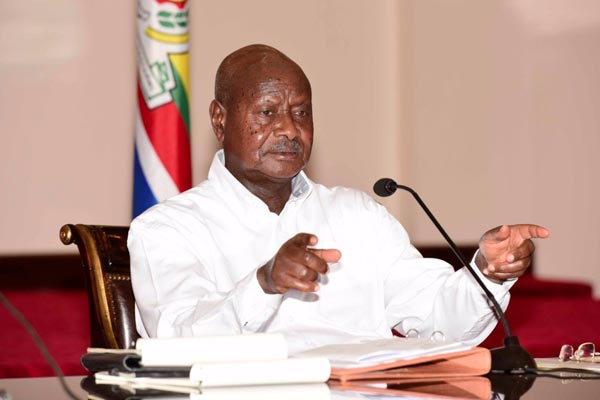President Yoweri Museveni has on Tuesday delivered a keynote address at the Uganda Chamber of Mines and Petroleum (UCMP) forum aimed at skilling Ugandans and developing local content capacity around the oil and gas industry.
Uganda’s petroleum sector will generate 100,000 to 150,000, direct and indirect jobs.
“We (Uganda oil) start one way or the other and if experts from countries around us that have the knowledge in extracting oil are needed to do the job, we shall hire them for a year or so as we accelerate training for our citizens,’ Mr. Museveni said at Kampala Sheraton Hotel as Uganda prepares for her first oil, locals are rubbing their hands in anticipation of the wide range of opportunities in the oil and gas industry.
“Nothing will delay us because everything has a solution. We have dealth with the policy issues already,” he added.
“Oil is just an appetizer, the real business is transforming this economy so that we get more jobs as well as build technical capacity and a strong base for the economy.”
According to the 2014 Industrial Baseline Survey (IBS), Uganda’s petroleum sector will generate 100,000 to 150,000 direct and indirect jobs.
Uganda Petroleum Institute Kigumba (UPIK), Uganda’s premier oil institute, recently restructured its curriculum and introduced five more oil courses.
And to prepare for the job at task, President Museveni has also appealed to investors and private educators to start technical schools to where the students’ families can pay for them or the government comes in and pays the tuition.
“Lets have more investors in private technical schools because that demand will continue sustainably,” President Museveni noted.
“Ugandans spend alot of money in education in India and many places abroad so especially when the oil industry has fully started, you will see many students falling in. In terms of dynamism, those private educators would really add alot of value to our system after calculating the deducatability.”
The President, who congratulated the emerging Chamber of Mines and Minerals for organizing the conference, also explained to participants the interventions government has and is implementing in order to create a conducive investment environment in the country that include, among many others, peace, provide information and data in the industry.

Apart from training individuals, preparing Ugandan companies to compete for contracts within the industry will also be a key subject at the conference.
A law to address the maximization of value-addition and job creation through the use of local expertise, goods and services, businesses and financing in all undertakings in the oil industry (the Local Content Bill) is being developed and were some of the major topics discussed on Monday and Tuesday.
With some of its core functions being to promote, encourage, protect and foster responsible exploitation and service delivery in the extractive sectors, Dr Elly Karuhanga, the Chairman of the Uganda Chamber of Mines and Petroleum says they are obliged to use its wide reach to help as many Ugandans as possible to work in the country’s oil and gas industry through avenues like this skilling & local content forum.
“Skilling takes time that it is why it’s called skilling. We need everyone to come and get skilled to manage our oil industry. This assembly will gather all institutions – public and private – that are involved in skills development and training to lay the ground for clear programs that will help Uganda achieve its Local Content aspirations,” said Dr Karuhanga.
The two-day conference was sponsored by various companies that include TOTAL, Tullow and CNOOC among others.
It is attended by the Minister of Energy and Mineral Development, Engineer Irene Muloni, Ministry of Education, British High Commissioner HE Peter West and Sports’ Hon. Rose Mary Nansubuga and senior government officials.












